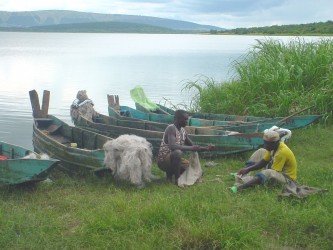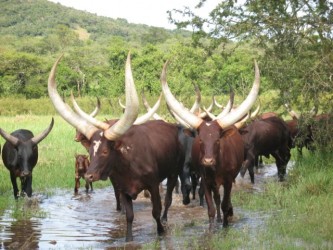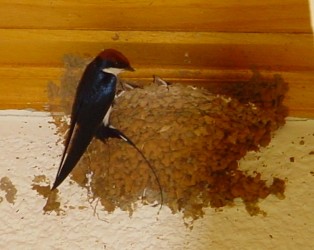
Over the Labour Day break I took a trip to Akagera National Park on the Eastern border of Rwanda, next to Tanzania. It is a large open expanse of savanna and woodland dotted with beautiful lakes. The wildlife is limited and rather hard to spot, but I did find some interesting examples of people trying to make livelihoods right on the edge of the Park.
Fisherman were netting tilapia from their canoes and selling them on to traders at ridiculously low prices. It certainly tasted great straight off their fire at the lakeside, but, as they say, you don't make money from producing food, only from trading it.

Then there were herdsmen driving their Ankole cattle - a traditional, but declining species in East Africa, which are famous for their huge horns. Ankole cattle are rarely eaten in Rwanda, but all the websites say that their meat has the lowest cholesterol count in the world - there must be a business opportunity in this for someone.
Although Kigali city has all the essential paraphernalia of a modern African city - glass fronted office blocks, good coffee shops and traffic jams - Rwanda is essentially a very rural country. About 80% of all Rwandans depend on agriculture for their living (in the UK it is less than 3%). Most farmers have very small plots of land and grow maize, beans and vegetables; some keep cows or goats which are kept in a pen and fed grass cut from the roadside. In the higher lands, they grow coffee and tea. So the country's economy is very dependant on the performance of agriculture; if there are good rains, like in 2008, the harvest is large and generally everyone gains. Of course, when the rains are poor, many people suffer.
While it is important for Rwanda to diversify and develop other sources of wealth and employment, agriculture is still critical for the majority of poor people. In DFID we have decided to concentrate on supporting two areas to help farmers: land title registration and access to finance. Having title to your land means you can invest in it with confidence, and you also have security to get a loan from a bank. But the banking system is still limited in Rwanda, so we are now developing a programme to help banks and finance institutions reach poor people more easily.
The above three-minute DFID YouTube video titled Rwanda: 15 years on - Land and Security shows how Mary and Rhamadan, two farmers from the north of the country have gained from getting their own title deed to their farm.

Just to finish off on the livestock theme: if you have read my earlier blog posts such as Dear Ollie, I mentioned the swallows on my balcony. They built a nest a few weeks ago, and the female had been sitting there quietly, while the male was perched on the handrail. Today I noticed that both parents were off the nest, flying back and forth every couple of minutes, obviously feeding their new babies. I hope they survive.

2 comments
Comment by Schadrack DUSABE posted on
I really appreciate the initiatives aimed at improving rural livelihoods especially in Rwanda. Iam a Rwandan by nationality and live there. I am among the few who have managed to further their studies up to Master degree level. I specialized in Rural Livelihoods and global change. May be this is the good reason of my special interest to the article on this blog.
Honorable Martin Reach, i do support your ideas but you better conduct research in Rwanda to see if the positive correlation between land titling , tenure security, investment on land and hence increased income opportunity holds. I am having this reserve because the banking sector which has largely gone commercial in Rwanda is still far from being convinved that even the poor farmer can have enough security to get loan and pay back especially when it comes to agriculture sector full of uncertainties and risks.
Also, the process of land consolidation that the government of Rwanda is privilegying and that DFID is supporting in Rwanda is a good policy but according to me still far from being pro poor (i am referring especially to the extremely poor in this case). With land consolidation, i still believe that the tenure security will still be on paper (de jure0 but de facto the smallholder will not enjoy that right at all unless the comsolidated land is only used as a cooperative farming system. I have a full research paper in this point may be we shall share some ideas about. I know my conclusions are not irreversible that is why a debate like this is welcome on my part
Best
Schadrack DUSABE
Comment by Gavana posted on
How much does one cow cost and which desease is likely attack this type of cattles.